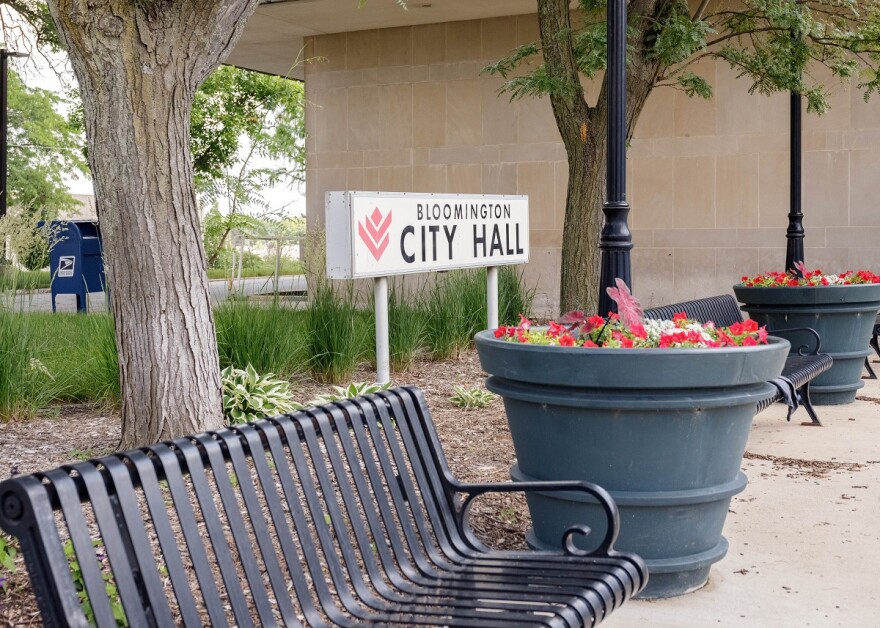The City of Bloomington on Tuesday released audio recordings and minutes from several closed-door meetings the city council held in 2016 and 2017 before ending a longstanding tax-sharing agreement with Normal.
The city shared the material after an appeals court ruled in April the city violated the Open Meetings Act. The city council on Monday voted following executive session to make the contents of those closed-door meetings public.
City Manager Tim Gleason noted in a statement much of the city council and administration have turned over since those meetings in which the council voted to terminate the decades-old Metro Zone agreement with the Town of Normal.
“It was a difficult time between the two communities, and I have made it a priority since joining the city to strengthen our partnership,” Gleason said. “While we respect the decisions of our predecessors, we likewise look forward to the possibilities of the future, including the many new endeavors and intergovernmental cooperation that lies ahead with the town.”
The Bloomington City Council went into closed session to discuss possible litigation on Oct. 24 and Nov. 14, 2016, and on Feb. 13 and Feb. 20, 2017. However, much of the discussion centered on the potential political fallout from canceling the decades-old Metro Zone deal — not a potential lawsuit.
In a recording from the Feb. 20 meeting, city attorney Jeff Jurgens interrupted then-mayor Tari Renner, when Renner suggested the city consider a joint resolution to force Normal to take a public stance.
“I’m talking about a bow to win the battle of public opinion,” Renner said.
“Probably we ought to stay clear of the PR aspect of it in (closed session),” Jurgens replied.
On several occasions, Jurgens told the council any talk about the political fallout from potentially canceling the deal must be done in public. Jurgens also told the council he believed the threat of a lawsuit from the Town of Normal was real, based on threats town officials had made, the fact the town had hired an attorney in the matter, and that upwards of $1 million annually was at stake.
“We believe the likelihood of litigation exists,” said Jurgens, though he added later during the meeting the town hadn’t made any legal arguments against the city.
Renner was seeking re-election as Bloomington mayor at the time. Current mayor Mboka Mwilambwe was running for re-election to the council, as was former council member Scott Black. All three won re-election that April.
Mwilambwe asked Jurgens if he thought Normal was bluffing about a potential lawsuit. “Do you think this threat of litigation is a negotiating tactic?” Mwilambwe asked.
Jurgens said that’s possible, but said the city had to be prepared for a lawsuit.
“Both communities see this as real money. Either (community) would be doing their taxpayers a disservice if they didn’t take a good hard look at it and see what they are legally entitled to,” Jurgens said.
Bloomington city officials contended the tax and infrastructure sharing agreement that covered western portions of the Twin Cities was more favorable to the town because most of the tax revenue at the time was coming from Bloomington.
Then-city council member David Sage said Normal had done little to develop the west side of town over the previous 20 years, but that the city wanted to remain a good neighbor, so it didn't jeopardize the town's deal with electric-vehicle maker Rivian to buy the former Mitsubishi Motors plant and waited to end the agreement later.
Sage said the city had been talking with the town about a more favorable agreement for nearly two years.
"We have bent over backwards with Normal on this," Sage said.
Black suggested he believed the town’s lawsuit threat was a bargaining tactic. Then- council member Kevin Lower, who was running against Renner for mayor, said he also supported terminating the Metro Zone deal, but said a lawsuit wasn’t his biggest concern.
“That PR issue is probably more expensive in dollar value than the fight,” Lower said. “The way the press is going to play this and the way the town is going to play this is more expensive.”
Lower and several council members suggested the city publicly tout the cooperative agreements the city still maintains with Normal, such as public safety.
The city council discussed suspending the agreement for a year and withholding payments so the city and town could work out a new agreement, but decided to terminate the agreement instead.
Normal did not file a lawsuit, but town officials did express public dismay about Bloomington terminating the deal.
“We have tried to be collaborative on this. We have asked for a discussion. We have agreed to dissolve the Metro Zone agreement with discussion on how we do that. That was all rebuffed," Town of Normal Mayor Chris Koos told WGLT at the time.


